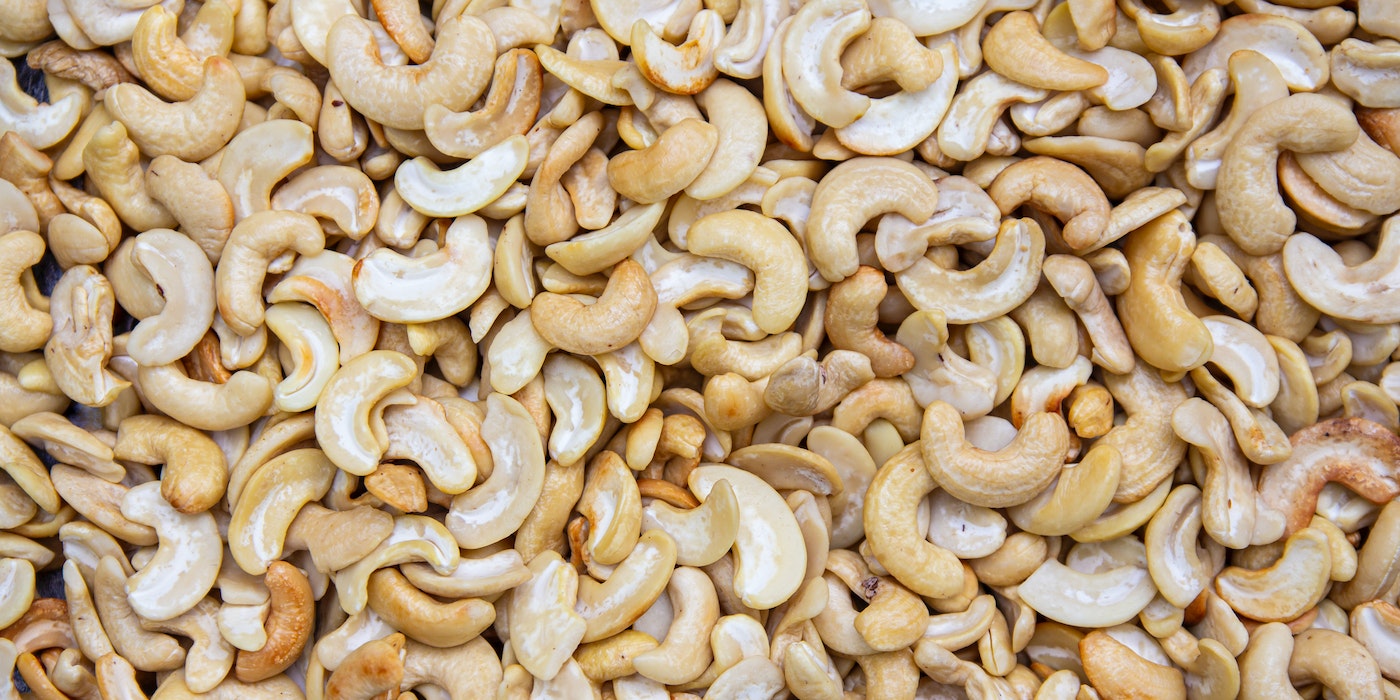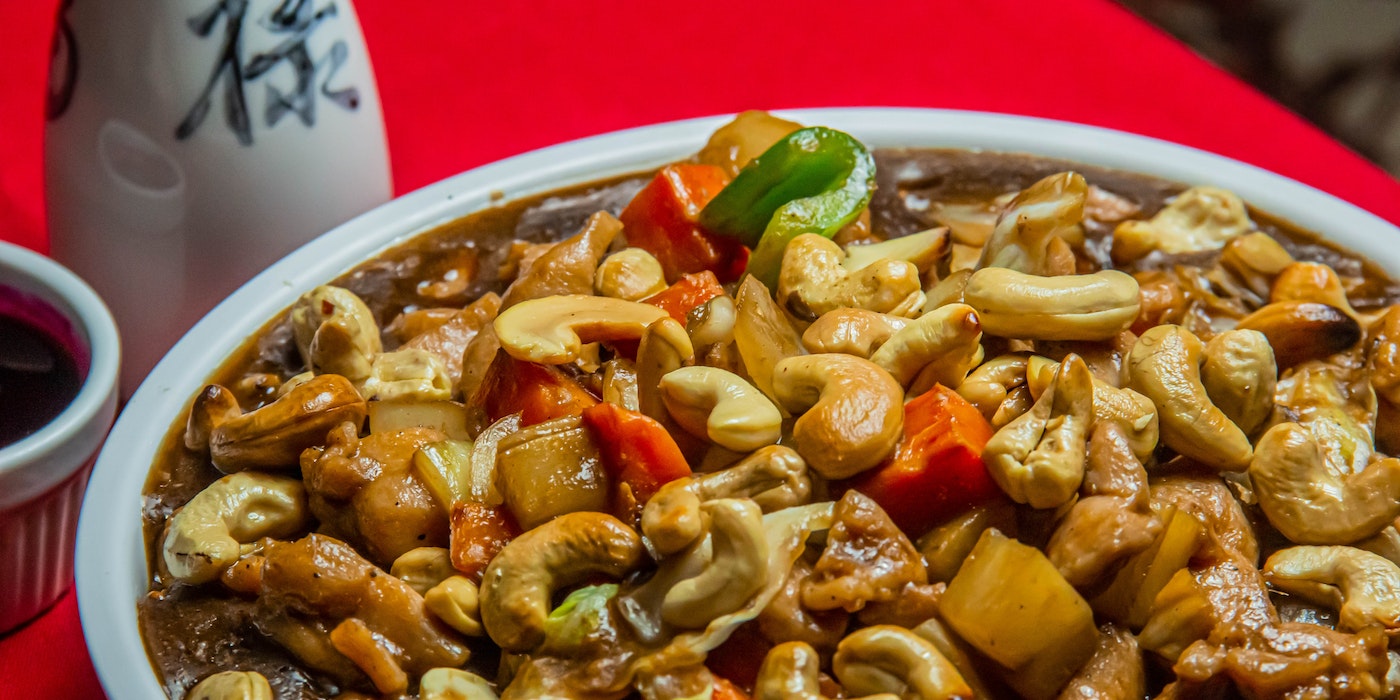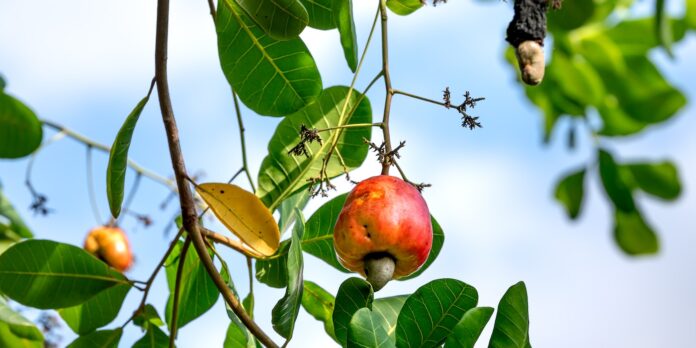Many people use cashew nuts regularly without being aware of their value. Any diet (vegan or meat-lover) can benefit from including them. They are delicious on their own, in food, and desserts and sauces made with cashews. We’ll examine the nutritional contents and health benefits of cashew nuts in this post to see if they’re beneficial to you.
The nut may appear raw and unprocessed when offered as a snack, but it is poisonous when it is still in the field. It needs to be roasted before it may be eaten without danger. To get to the delicious substance inside the cashew, the exterior must be removed, even after the required heating. The cashew’s high price as well as its coveted position even among identical nuts can be attributed to this labor-intensive technique.
What is Cashew Nut
Cashew nuts are kidney-shaped seeds sourced from the cashew tree. Although cashews are frequently marketed as “raw,” they should not be eaten because they contain a poison ivy compound called urushiol. Because urushiol is poisonous, some people may experience a physical reaction when exposed to it.
Cashews are actually seeds, despite being frequently mistaken for tree nuts and having similar nutritional value. They are a simple addition to many recipes and are packed with vitamins and healthy plant elements.
Where are Cashew Nut Found
In addition to some Caribbean Islands, cashew nuts are indigenous to Central and South America (particularly Brazil). They have been appreciated in these locations for a very long time. The nut was first noticed by Europeans in the late 1500s. They then spread fast to portions of Africa and India. During the 1920s, they gained popularity in the US. Today, cashew nuts are grown all over the world in a variety of warm regions.
Nutritional Components of Cashew Nut
The monounsaturated and polyunsaturated fats found in cashew nuts are excellent for your health. They are much healthier for all ages because they are high in fiber and low in sugar. These nuts also provide a moderate amount of protein.
 They frequently play a significant role in the diets of vegetarians and vegans as a result. The following minerals are all abundant in cashews;
They frequently play a significant role in the diets of vegetarians and vegans as a result. The following minerals are all abundant in cashews;
- Magnesium
- Manganese
- Phosphorus
- Zinc
- Vitamin B6
- Vitamin K
- Copper
6 Remarkable Health Benefits of Cashew Nut
There are many benefits of cashew nuts as they contain essential vitamins and minerals. These are six health benefits of cashew nuts to our body.
Boosts Immunity
Cashew nuts have a considerable amount of copper which is essential for the immune system. They are a well-known source of antioxidants, as are other nuts and seeds. Antioxidants are advantageous plant chemicals that maintain your body’s health by scavenging molecule-damaging free radicals. In turn, this lessens inflammation and improves your body’s capacity to be wholesome and disease-free.
Carotenoids and polyphenols are abundant in cashew nuts. These two antioxidant classes are likewise present in other tree nuts. Studies show that nuts like walnuts, pecans, and almonds contain antioxidants that reduce the risk of oxidative cell damage.
Cashews may be anticipated to have comparable oxidation-fighting advantages due to their similar antioxidant profile. This may be especially true for cashews that have been roasted, which seem to have more antioxidant effects than their “raw” counterparts.
Protection Against Type-2 Diabetes
Cashew nuts are high in fiber and low in sugar. When these two elements are together, blood sugar levels are lowered, and type 2 diabetes is prevented from developing. Including cashews in your diet may be beneficial for those who have type 2 diabetes. This is because cashew nuts are an excellent source of fiber. Fiber is a nutrient known to give protection against type 2 diabetes and helps avoid blood sugar increases.
Additionally, cashew nuts lower overall insulin levels. Particularly when compared to other popular snacks, cashews are low in carbs. Because of how little impact they have on blood sugar, they are a fantastic alternative for people with type 2 diabetes as well as those trying to avoid the disease.
Improves Heart Health
A lower risk of diseases like heart disease and stroke has been repeatedly associated with diets high in nuts, particularly cashews. Additionally, cashew nuts decrease cholesterol and blood pressure, which is important for a healthy heart. Due to their high magnesium concentration, cashews may also decrease cholesterol in addition to preventing heart disease.
The risk of ischemic heart disease may be decreased with proper magnesium intake. When the heart does not get enough blood, this frequently happens. Cashews contain magnesium, which may lower the risk of stroke. This connection is most notable for hemorrhagic strokes, which are caused by weak blood vessels that burst and pour blood into brain tissue.
Healthy Bones
Cashew nuts are among the few copper-rich food sources. Copper is also essential for the maintenance of collagen and elastin, two major structural components of our bodies. Severe copper deficiency is linked to reduced bone mineral density and an increased risk of osteoporosis.
Without enough copper, the body is unable to replace damaged connective tissue or the collagen that forms the scaffolding for bone. As bodily tissues begin to degrade, this can cause a variety of issues, including joint dysfunction. The magnesium in cashews is also beneficial to bone formation because it aids in calcium assimilation. Another mineral found in cashews, manganese, has been shown to help prevent osteoporosis when combined with calcium and copper.
Improves Eye Health
Our eyes are frequently infected as a result of the urban environment’s excessive pollution. Zea Xanthin is a powerful antioxidant pigment found in cashew nuts. Our retina easily and directly absorbs this pigment. This then forms a protective layer over our retina, preventing UV rays from harming us. Small amounts of Zea Xanthin help prevent age-related macular degeneration in the elderly, thereby maintaining eye health.
Promotes Healthy Skin and Shiny Hair
The cashew nut contains selenium, zinc, magnesium, iron, and phosphorus. They are also rich in proteins, phytochemicals, and antioxidants. The high selenium content of cashews not only benefits your skin but also helps prevent cancer.
According to experts, eating cashews and applying cashew oil to your scalp promotes healthy hair. The copper in cashew nut oil aids in the production of melanin, a skin and hair pigment. Because of the presence of linoleic and oleic acids, it also improves hair color and can provide a silky-smooth texture.
Ways to Enjoy Cashew Nut
Cashew nuts can be used in a variety of dishes in addition to being frequently consumed on their own as a snack. They offer a pleasant crunch as well as a deliciously nutty flavor. They are therefore a fantastic alternative for adding texture to a variety of foods and baked goods.
 The following are a few quick ways to incorporate cashews into your preferred dishes and snacks.
The following are a few quick ways to incorporate cashews into your preferred dishes and snacks.
- To make a trail mix, combine cashew nuts with dried fruit, chocolate chips, and other nuts.
- For a nutritious and filling salad, combine cashew nuts with romaine lettuce, tomatoes, and a touch of olive oil.
- Add to a wrap that has mayonnaise, mustard, and diced chicken.
- Add rolled oats, maple syrup, and coconut to the mixture. To make granola, combine these ingredients before baking.
- Roasted green beans can be topped with salted cashews.
- Enjoy in a delightful parfait with yogurt, granola, and fruit.
- In a slow cooker, prepare the rice, soy sauce, chicken, and red pepper flakes.
- Toss in the oyster sauce and soy sauce-coated lo mein noodles.
The Dangers of Cashew Nuts
Cashew nuts can cause allergies in some people, but less frequently than tree nuts or peanuts. Consuming cashew nuts could set off allergic responses in certain people, which could range from minor discomfort to potentially fatal allergic reactions. The proteins in tree nuts that cause these allergies are generally not altered or removed during cooking. Similar to poison ivy, the cashew nut’s shell contains oil-based chemicals that can cause chronic skin inflammation. Cashew nuts are normally not offered to customers in the shell due to the potential for dermatitis.
Remember that cashews that have been roasted or salted may have had a lot of extra oils or salt added. For this reason, choosing unsalted dry roasted, or unroasted (raw) kinds may be preferable. Additionally, the phytates found in cashews may make it harder for your body to digest the vitamins and minerals they provide. To lower their phytate level and increase their digestion, soak your nuts in water for at least an entire night before incorporating them into recipes.
Conclusion
Cashew nuts are extremely healthy for the human body. These nutrient-dense seeds are a tasty addition to any meal. However, before incorporating cashews into your diet, consult your doctor to ensure you are not allergic to these nuts. Because cashew nuts are heavy in calories, it’s recommended to eat them in moderation.
Remember that some people may experience serious allergic responses if you serve these nuts. Cashew nuts should be transported to an airtight container after being bought in bulk. They should be maintained away from substantial sources of heat regardless of how they are stored. For temporary storage, room temperature is suitable. Cashew nuts can be stored for a long time in the refrigerator or freezer.




